Discover how Looxloo boosted site search accuracy and conversion with hybrid fashion search powered by AI, semantic search, and image product search.
by YesPlz.AIOctober 2025
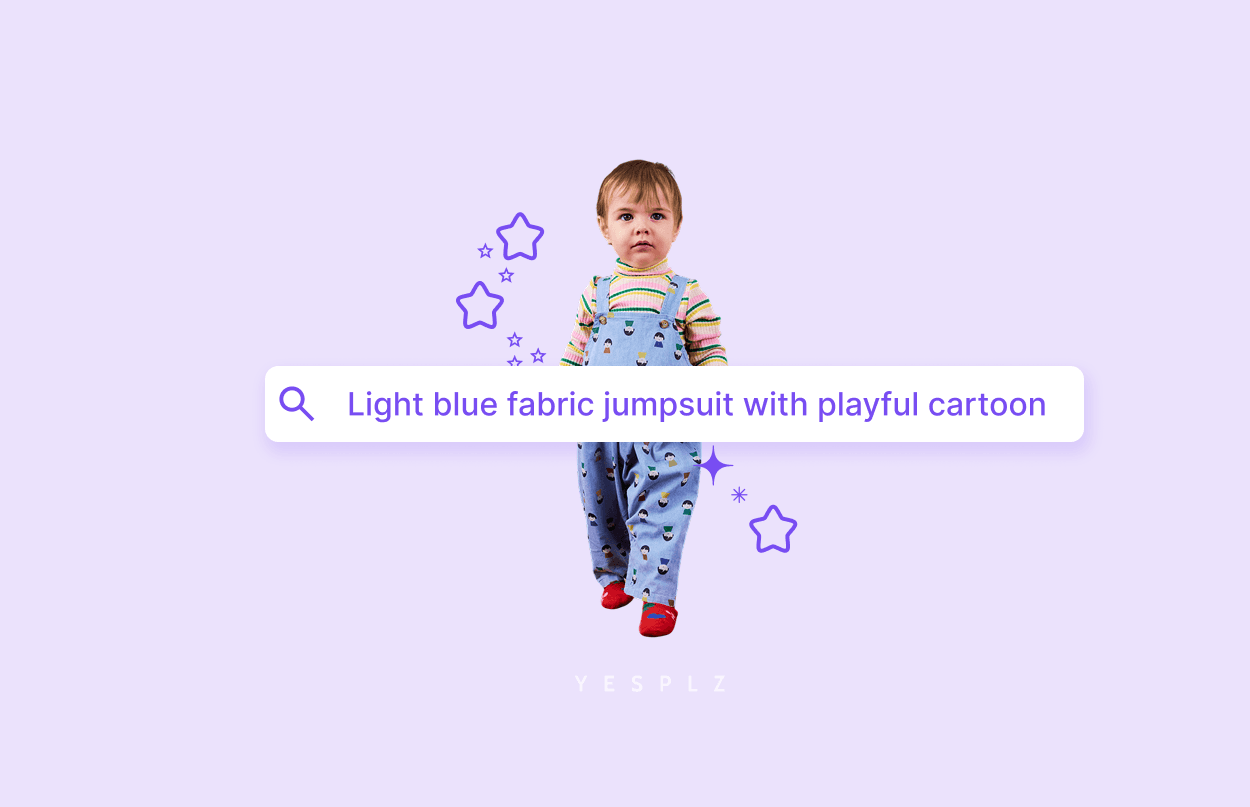
In the competitive world of kids’ fashion eCommerce, search functionality can make or break the shopping experience. When busy parents can’t quickly find the desired item, they abandon the site and take the business elsewhere. For Looxloo, a specialized children’s fashion retailer, this issue was costing them sales every single day.
Table of Contents:
Looxloo faced a search challenge that negatively affected its entire shopping experience. Its old search system required shoppers to think exactly like whoever wrote product titles. Shoppers could only find products if they entered their exact names, which, of course, wasn’t realistic.
Consider a simple search, such as “leggings.” One parent types exactly that. Another searches for “yoga pants.” A third tries “stretchy pants." And, a grandmother seeking a gift might search "athletic tights for girls.” Four different searches all refer to the same items. Yet, each shopper naturally uses different phrases shaped by their vocabulary, region, age, and shopping habits.
This variation in search terms is perfectly normal. But Looxloo's old search engine wasn’t built to understand it. It led to failed searches and abandoned sessions. Fixing the issue wasn’t easy. Product names in the Looxloo catalog acted as permanent IDs within its architecture. Even if the team renamed all instances of “tights” to “leggings” based on search data, doing so could risk corrupting its entire database.
YesPlz AI stepped in with a hybrid search solution that reimagined how Looxloo shoppers could discover products. Rather than relying on keyword matching, we implemented a multi-layered approach combining:
Semantic search to understand shopper intent
Image product search to extract detailed, fashion-specific attributes directly from product images
Automatic search keyword optimization: AI handles synonyms, typos, and popular keywords
What made this AI search particularly powerful for Looxloo was specialized synonym generation, purpose-built for kids’ fashion vocabulary. It allowed shoppers to locate products using natural language, synonyms, and visual cues, eliminating the frustration of having to type exact product names.
The transformation was immediate, and the numbers told the story:
Search Accuracy improved from 0.82 to 0.95 (16% increase)
Average Response Time reduced from 1.54s to 0.40s (74% reduction)
Add-to-Cart Conversion Rate at 1.8x industry benchmark
To measure transformation in Looxloo search performance, we evaluated 55 distinct keywords. They spanned multiple product categories, including accessories, footwear, legwear and hosiery, headwear, outerwear, etc. These keywords represented the full spectrum of how real shoppers searched for kids’ clothing. They ensured we captured performance across Looxloo’s entire catalog. Our testing approach simulated authentic, real-world query patterns based on actual shopper behavior. It gave us confidence that improvements would translate directly to better shopper experiences.
We organized our testing into three distinct query complexity levels:
Simple Search Queries included single-word searches such as "scarf," "swimsuit," or "pants." These were straightforward terms shoppers typed when they had a clear product category in mind.
Simple Modifier Queries added one descriptive element, for example, "crossbody bag," "jogger pants," or "knee socks." The objective was to test how well our hybrid search system handled basic attribute filtering.
Compound Search Queries pushed the system with complex phrases, let’s say, "long sleeve shirts" or "floral pink dresses." These multi-attribute searches required contextual understanding and semantic search capabilities to deliver relevant results.
We tracked four metrics of search performance to ensure a holistic evaluation:
Search Accuracy: Measured the relevance and precision of search results on a 0-1 scale.
Response Time: Captured the speed of result delivery in seconds, recognizing that even the most accurate results lost value if they took too long to appear.
Click-Through-Rate: Measured the percentage of searches that result in a product click.
Cart Conversion Rate: Our ultimate business impact indicator, measuring the add-to-cart rate that directly connected search quality to revenue.
When comparing the hybrid search against Looxloo’s previous GraphQL-based system, the transformation was clear. Search accuracy jumped 16%, from 0.82 to 0.95. Response time showed the most dramatic improvement, decreasing by 74%, from 1.54 to 0.4 seconds. Busy parents now consistently and quickly find what they’re actually looking for.
For straightforward, single-word searches, the hybrid search delivered outstanding results. Take the query “jeans” as an example. Both the previous site search and YesPlz AI achieved a perfect 1.0 accuracy. But that’s where the similarity ended. YesPlz AI responded in just 0.19 seconds, compared to the previous system’s 1.2 seconds. And while the previous site search returned only one product, YesPlz AI surfaced 130 relevant items, offering shoppers a much richer and faster search experience.
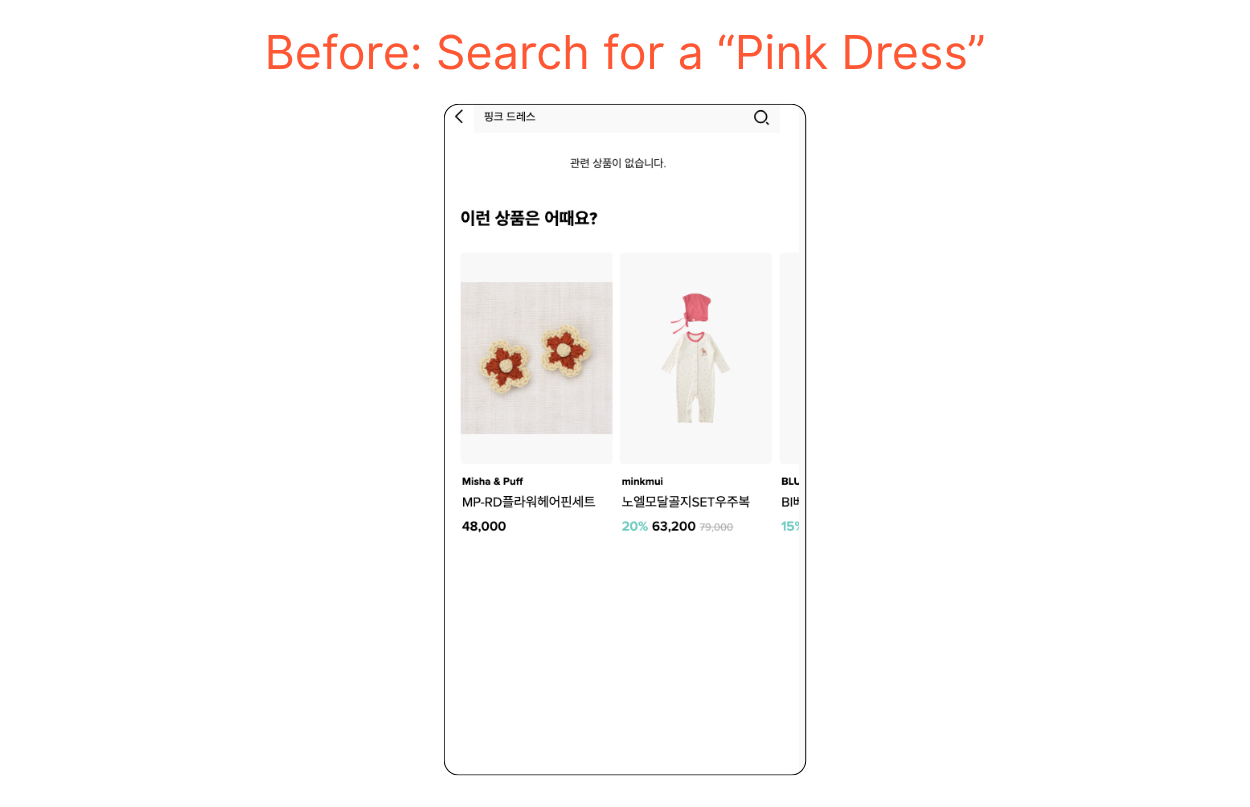 Simple modifier queries also showed impressive improvements in accuracy. A search for “pink dress” under the old system returned two completely irrelevant products. Meanwhile, YesPlz AI delivered precise results, including pink dresses, blouses, and coordinated sets. This success came from the combination of semantic search, image product search, and keyword matching. These elements worked well together to help shoppers find their desired items, no matter how they phrased their search.
Simple modifier queries also showed impressive improvements in accuracy. A search for “pink dress” under the old system returned two completely irrelevant products. Meanwhile, YesPlz AI delivered precise results, including pink dresses, blouses, and coordinated sets. This success came from the combination of semantic search, image product search, and keyword matching. These elements worked well together to help shoppers find their desired items, no matter how they phrased their search.
 Longtail Queries
Longtail Queries
Longtail queries, for instance, "pink floral print dresses" or "short sleeve graphic t-shirts," reflect how parents actually shop. These searches combine multiple, specific attributes within a single phrase.
Consider "pink floral print dresses." This query requires an understanding of three distinct attributes: color (pink), pattern (floral print), and category (dresses). The old search system struggled with this level of complexity. It returned products matching only one or two, but not all three criteria. Or worse, it showed up irrelevant products that contained those keywords in their titles.
The hybrid fashion search, however, delivered a dramatically improved experience. Shoppers now see a curated collection of items that accurately match all three attributes. It recognized that "floral print" could take many forms, from small ditsy patterns to large botanical designs, and even embroidered flower details. It thus provided results that felt natural, nuanced, and visually relevant.
 Looxloo Critical Problem Resolution
Looxloo Critical Problem ResolutionLooxloo's old system demanded exact matches between the words shoppers typed and the literal text in product titles. When a product was titled “girls’ athletic tights,” it would not appear in results for a “leggings” query, even though both referred to the same item. The outcome was a disappointing 0.2 accuracy score for the “leggings” query. Parents searching for this item were left frustrated. Looxloo lost sales to competitors who delivered better search results.
YesPlz resolved this issue through semantic search powered by deep learning fashion embeddings. Our AI search engine didn’t just match words. It understood the conceptual relationships between fashion items. It recognized that leggings, tights, yoga pants, or athletic bottoms all refer to similar garments with subtle style differences.
For kids’ fashion specifically, our synonym generation captured how parents used different search terms for the same item. The result spoke for itself. YesPlz AI achieved a perfect 1.0 accuracy for the “leggings” query. This was a complete transformation that turned Looxloo's worst-performing search into its best.
With multiple-attribute queries, the keyword matching search system struggled to distinguish between main categories and modifying attributes. For example, in the query “short sleeve graphic t-shirts," the system displayed a random mix of shorts, long-sleeve t-shirts, and any other products containing one of those keywords in their titles. The results were inconsistent, irrelevant, and slow. On average, it took 1.5 seconds to return over 100 products, many of which didn't match the shopper's actual intent.
YesPlz resolved this issue through an automatic image-based product search, combined with advanced natural language understanding. Using computer vision, our AI analyzed every product image to identify and tag a comprehensive set of fashion attributes. For example, a t-shirt was tagged with details such as sleeve length, pattern type, fit style, color, etc. When a shopper searched for “short sleeve graphic t-shirts," the semantic search engine broke the query into structured attributes. It then matched them against both text descriptions and visual tags. This dual approach ensured relevant results even when product titles used different terminology.
 How Hybrid Fashion Search Works
How Hybrid Fashion Search WorksAt the foundation of hybrid search lies sophisticated fashion embedding tech that brings true contextual understanding to product discovery. Unlike generic search engines, YesPlz’s embeddings are trained exclusively on fashion data. These are data from millions of products, their descriptions, and shopper interactions across the fashion industry. This specialization means our AI understands fashion in ways general-purpose search cannot.
Even the most advanced AI search engine benefits from intelligent keyword optimization. And that’s why we implement automated keyword generation for every product. Our system analyzes each product attribute to automatically create a comprehensive set of search keywords that go far beyond the original product title. This feature dramatically improves product discoverability. A single item can appear in multiple shopper queries despite the search keywords they use.
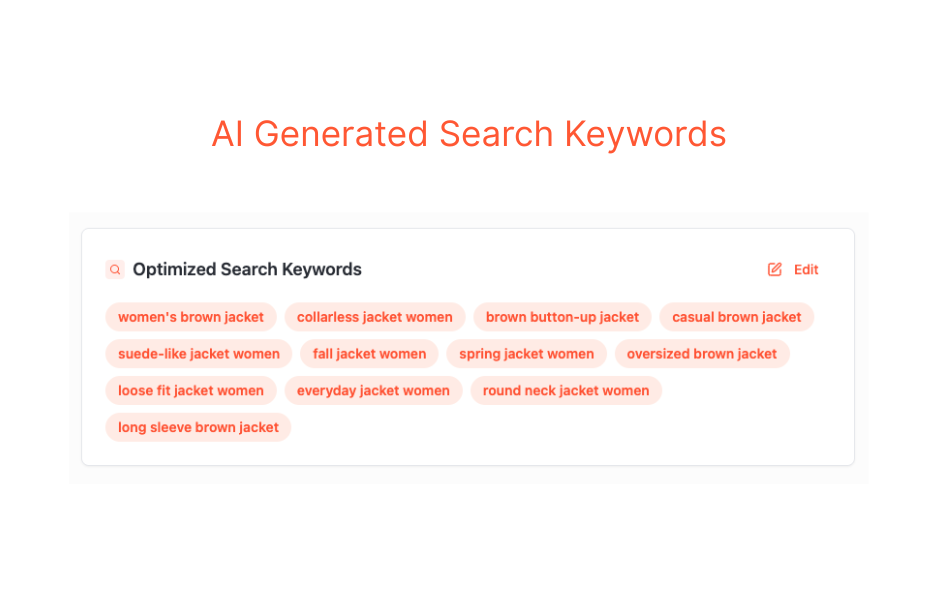 The beauty of automation is consistency. Every product receives this optimization treatment. It eliminates the hit-or-miss results that come from manually tagging items. Along with semantic search, these optimized keywords create a safety net. Even if the fashion embedding model misses a specific synonym, this feature captures it. So, shoppers can enjoy accurate and relevant search results.
The beauty of automation is consistency. Every product receives this optimization treatment. It eliminates the hit-or-miss results that come from manually tagging items. Along with semantic search, these optimized keywords create a safety net. Even if the fashion embedding model misses a specific synonym, this feature captures it. So, shoppers can enjoy accurate and relevant search results.
Visual intelligence powers a significant portion of our image product search capabilities through advanced computer vision tech. For each product image, our AI automatically analyzes and extracts dozens of searchable visual attributes. This automated tagging serves two key purposes:
It delivers more accurate search results by matching visual attributes directly to shopper queries.
It enables powerful filtering options that help shoppers narrow results by the attributes they care about most.
 Automated Synonym Generation for Kids' Wear
Automated Synonym Generation for Kids' Wear
Kids’ fashion presents a unique challenge. Its terminology varies widely across regions, brands, and even age groups. Furthermore, children's sizing differs significantly from adults’. This issue adds another layer of complexity to search accuracy.
Our specialized synonym generation system addresses this by building a comprehensive vocabulary map, tailored specifically to children’s clothing. It understands that terms like "onesie," "bodysuit," "romper," and "one-piece" refer to similar garments. Likewise, size-related searches, such as "toddler pants" or "infant shoes," are properly categorized and matched.
 The system runs continuously. It incorporates new trending terms from social media and fashion culture into the search vocabulary. The result is a natural and intuitive fashion search experience. Parents can receive accurate results, regardless of which terms they use.
The system runs continuously. It incorporates new trending terms from social media and fashion culture into the search vocabulary. The result is a natural and intuitive fashion search experience. Parents can receive accurate results, regardless of which terms they use.
The ultimate measure of search success isn’t accuracy scores or response times—it’s whether shoppers actually find products they want to buy and add them to their cart. Looxloo now achieves add-to-cart conversion rates that are 1.8 times higher than the industry benchmark. This means:
Higher shopper satisfaction with search results
Improved product discoverability
More efficient path to purchase
Significant revenue increase potential
Accuracy Matters: A 16% improvement in search accuracy translates directly to better shopper experience and higher conversion rates.
Speed Kills (Friction): 74% faster response times eliminate a major source of shopper frustration and abandonment.
AI Solves Real Problems: Fashion embedding and image-based tagging address fundamental limitations of traditional keyword matching.
Business Results Speak Loudest: 1.8x industry benchmark conversion rate demonstrates the tangible ROI of superior search technology.
Request a demo to see how our AI search, semantic search, and image product search technologies can deliver measurable business results for your store, just as they did for Looxloo.

Written by YesPlz.AI
We build the next gen visual search & recommendation for online fashion retailers
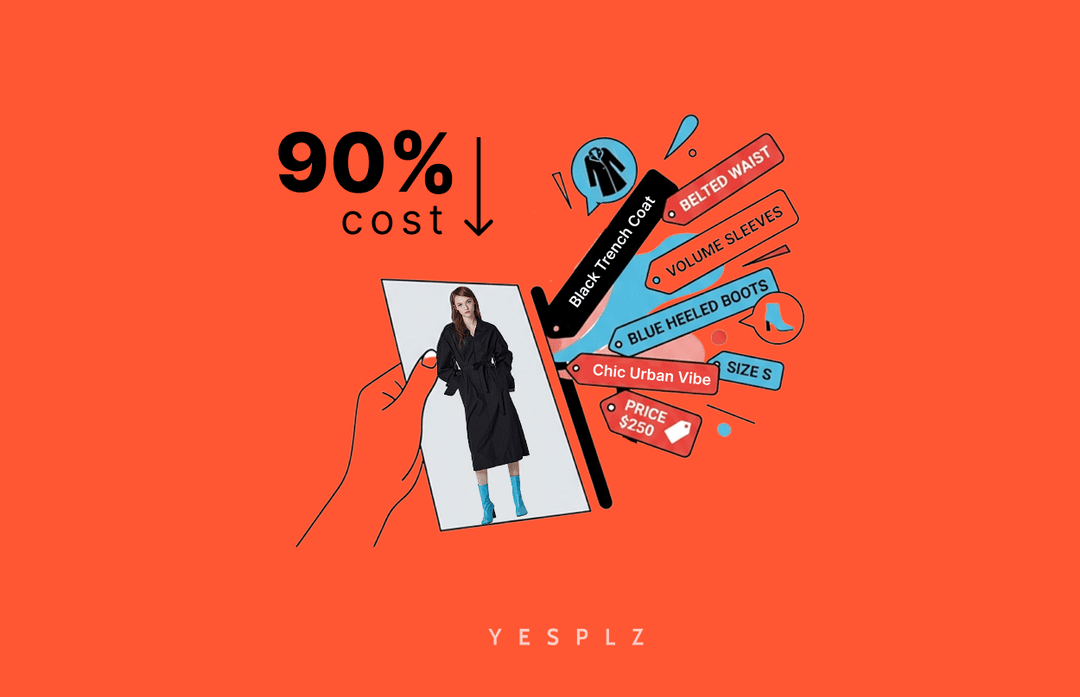
Inconsistent tags hurting sales? Self-service product tagging delivers accuracy and speed without enterprise prices. Tag products 10x faster at 90% lower cost.
by YesPlz.AI
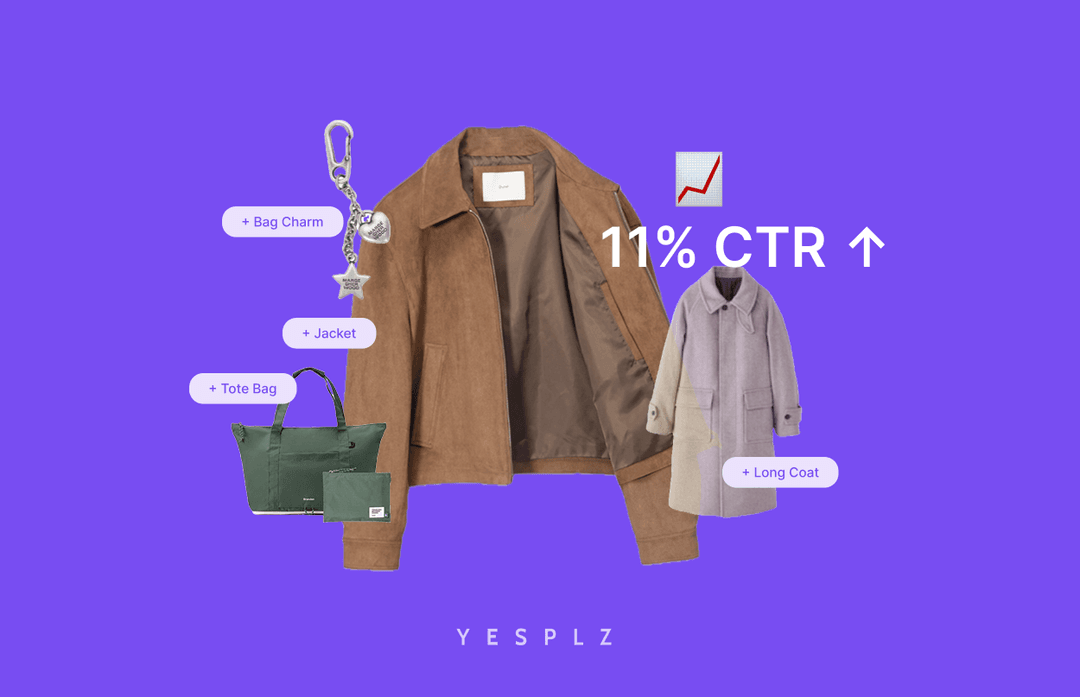
We analyzed 13,374 fashion searches. AI tagging increased product discovery by 22% and boosted clicks by 11%. Here’s what the data revealed.
by YesPlz.AI